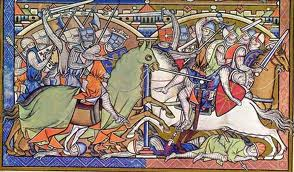“It’s rare to see the Templars arrive late for a battle,” Sir Walter noted with a short laugh, pointing to a Templar galloping on to the field from their left. They all turned to watch with bemusement. The Templar pride at always being first in battle grated on their nerves to some degree. As they watched, more Templars appeared, also at a full gallop but not in any kind of formation. At almost the same instant, they collectively realized these Templars weren’t attacking: they were fleeing.
Ibelin automatically looked left to see what the Templars
were fleeing from, and gasped: “Holy Cross and St. George!” A wide, deep line
of Saracen horse had crested the hill with all their banners fluttering. Salah
ad-Din’s banner was the largest, in the middle of the host.
Ibelin jammed his helmet on his head, pulled his shield back
onto his left arm, then grabbed up his reins as he put his spurs to his
stallion. Around him his knights frantically did the same without being
ordered. It didn’t take a genius to recognize the danger they were in: the
Christian army was scattered all over the field. Ramla was across the river; Tripoli and Lusignan had
been lured fully two miles to the north in their maneuver to cut off Farrukh-Shah’s
escape. And even those knights still on the battlefield were, like Ibelin and
his hundred knights, dispersed and partially spent.
Fortunately, Centurion had been refreshed by the drink and
the soothing coolness of the running water on his legs and belly. He responded
with alacrity. Once he was out of the river and onto the firmer ground of the
plain, Balian stood in the stirrups and leaned forward, urging him onwards.
Soon the stallion was going flat out, leaping over the bodies of man and horse
in a mad dash to rejoin the King’s forces.
On his right, Lusignan and his knights were also racing back
to rejoin the King, while Tripoli took charge of the valuable prisoner and with
a handful of his knights rode west for the coast.
The sound of the approaching Saracen charge became an
increasing rumble. The Saracens could see their foe spread out and vulnerable
before them—and could see Ibelin and Lusignan rushing to regroup. They, too,
spurred their mounts forwards. Neither army had mustered infantry for what on
the Muslim side had been a raid, and on the Christian side a counter-raid. Nor
did Salah ad-Din appear to have the usual contingents of mounted archers; they
had apparently been deployed with Farrukh-Shah. The Saracen horse thundering
down toward the scattered Frankish forces were heavy cavalry armed with lance
and sword. They shouted battle cries, the wind fluttered the pennants on their
lance tips, and the sunlight caught on their raised swords. Centurion laid his
ears flat back on his head as he raced, determined to escape the onslaught from
his left.
But they weren’t going to make it. The enemy was advancing
too fast.
They could not risk being run over from the side.
Ibelin flung out his left arm toward the enemy to indicate
they had to turn into the attack. He could not take the time to look over his
shoulder to see if his knights understood him. Instead, he reached forward and
with his left hand took hold of the bridle directly behind the bit. Then he
leaned with all his weight on his shield arm and pulled Centurion around—more
by the strength of his will than his arm. He barely managed to sit back in the
saddle before the lines of horses clashed.
Centurion was thrown on his haunches by the impact from the
first lance, and Balian felt blows raining down on his shield, helmet, forearms,
and thighs. As the enemy swept past him, each Saracen within range tried to
kill him without actually stopping.
That was what saved his life. After their lances shattered,
the slashing strokes of the Saracens’ swords as they swept by could not
penetrate his chain mail. It took a direct, piercing blow to penetrate the
linked steel rings, and none dared slow long enough to deliver that kind of
thrust.
Ibelin huddled behind his shield, his head down to protect
his face and eyes, making no attempt to fight until Centurion recovered his
balance and began staggering and stamping his way forward, with a dogged
determination that testified to the stallion’s own will to survive. At once Balian
straightened, and screaming to reawaken his own courage, he started fighting—even
if this consisted of little more than warding off the blows still directed at
him, using both his shield and his sword.
Finally the wave of Saracen cavalry rolled over them, and
the knights of Ibelin and Nablus emerged from the clouds of dust billowing up
behind the enemy. Like islands in the swirling dust, clusters of mounted fighting
men emerged. They were scattered across three hundred yards. Immediately beside
and behind Balian, the knights of Ibelin still made up a coherent body of men,
while the knights of Nablus formed a half-dozen distinct clumps.
But there were also a score of unhorsed men staggering out
of the clouds of dust, stumbling, coughing, holding their hands to their
bleeding wounds or cradling broken wrists, dislocated elbows, and wrenched shoulders.
As the dust settled further, the trampled corpses of horses and a half-dozen other
men emerged, while the piercing screams of a wounded stallion struggling to get
to his feet despite two broken legs blotted out all other sounds.






